http://weelookang.blogspot.sg/2012/06/workshops-on-easy-java-simulation.html
Briefing Document: Easy Java Simulation (EJS) Workshops and Open Source Physics in Singapore
Document Overview:
This document summarizes the key themes and information presented in the provided source, which primarily details workshops on Easy Java Simulation (EJS) and related Open Source Physics (OSP) initiatives in Singapore. The document highlights the pedagogical approaches, tools, and goals of these programs, with a focus on teacher development and the use of simulations for inquiry-based learning.
Main Themes:
- Teacher Professional Development: A central theme is the focus on empowering teachers to use and customize simulation software. The workshops described are specifically designed for physics teachers at various levels (primary, secondary, junior college) and aim to equip them with the skills to design and implement computer-based learning activities.
- Easy Java Simulation (EJS) as a Key Tool: EJS is presented as a powerful, free, and open-source authoring toolkit for creating interactive physics simulations. It is emphasized that these simulations are customizable, allowing teachers to tailor them to specific learning objectives and curricula. The workshops focus on teaching educators how to use the toolkit.
- "The Open Source Physics community using Easy Java Simulation (Esquembre, 2004) has created hundreds of computer models (simulations) that could be customized (Wee & Mak, 2009) to the Singapore syllabus for more targeted productive activities."
- Inquiry-Based Learning: The workshops promote an inquiry-based approach to learning physics, where students actively engage with simulations to explore concepts and construct their own understanding. The use of simulations is viewed as a means to create a lab-like environment in the classroom.
- "The facilitators argue that computer models are appropriate laboratory environments that can provide the experience and context for learning. This is essential for deepening student’s conceptual understanding of Physics through student centered guided inquiry approach supported by social discourse."
- Open Source and Open Educational Resources (OER): The workshops actively leverage OER and open-source tools. EJS itself is open source, and the workshops aim to connect teachers with a large collection of existing simulations that can be freely used and modified. There is a clear emphasis on sharing and reusing educational resources.
- Experiential Learning: Experiential learning theory (Dewey, 1958; Kolb, 1984) is presented as a core framework, with computer models (Wolfgang Christian, Esquembre, & Barbato, 2011; Wee, 2012b) serving as the “experience” component of the cycle. There is a connection between real-world experience and simulation experience to help bridge knowledge gaps for learners.
- Emphasis on Student-Centered Learning: The materials suggest that simulations should not replace good pedagogical practice. Instead, they should enhance learning by allowing students to become active agents in their educational journey. The workshops emphasize that good simulations can support deeper understanding.
Important Ideas and Facts:
- Workshop Details:The workshop described in detail is "Teacher-led Workshop: Designing Computer Models for Physics Inquiry Using Easy Java Simulation."
- It took place on February 21, 2013, at the Academy of Singapore Teachers.
- Instructors were Wee Loo Kang, Lee Tat Leong, and Lye Sze Yee.
- The objective is to enable teachers to download, navigate, and author simulations using the EJS toolkit, download open-source codes, and publish their own models.
- Participants included teachers from several schools, including Innova JC, Meridian JC, National JC, Queensway Sec, Springfield Sec, and Zhonghua Sec.
- Software Requirements: Participants were required to have Java installed and may need Java 3D for some simulation development.
- Theoretical Foundations: The workshops are grounded in educational theories such as experiential learning (Dewey, Kolb) and utilize approaches like Physics by Inquiry (McDermott, Shaffer, & Rosenquist, 1995) and Modeling Instruction (Jackson, Dukerich, & Hestenes, 2008).
- Evidence of Impact: The document cites evidence (from Wee, 2012b) suggesting that students find virtual labs fun and engaging, that they help students to develop a deeper understanding of physics concepts and that simulations can help students think like scientists. Students want simulations that are well designed, high quality and also function like games, creating a more interactive learning environment.
- Open Source Physics Community: The document highlights the role of the Open Source Physics community (OSP) in developing and sharing simulation resources.
- Award-Winning Initiatives: The workshops build on the success of the "Gravity-Physics by Inquiry" project, which won the MOE Innergy (HQ) GOLD Award.
- Broader Initiatives: The workshop is part of a wider effort to promote the use of simulation in education with a variety of workshops and conferences, as well as the development of a wide variety of simulations.
- Creative Commons Licensing: The educational resources are made available under a Creative Commons Attribution-Share Alike 4.0 Singapore License, facilitating the widespread use of the tools and resources that are part of the initiative.
- Wide Variety of Resources: The document also points to a rich set of other resources and projects related to the use of technology in education. There are workshops and resources that apply to other fields as well, such as mathematics, chemistry, and primary education.
Key Quotes Supporting the Ideas:
- On Experiential Learning & Inquiry: "We argue that computer models are appropriate laboratory environments that can provide the experience and context, essential for deepening student’s conceptual understanding of Physics through student centered guided inquiry approach supported by social discourse."
- On Customization: "The Open Source Physics community using Easy Java Simulation (Esquembre, 2004) has created hundreds of computer models (simulations) that could be finer customized (Wee & Mak, 2009) to the Singapore syllabus for more targeted productive activities."
- Student Feedback: “It makes learning much more interesting and fun. It makes us want to learn and find out more about the topic”. “Normally people would have to experience any physics concepts themselves hands [-] on to really remember concepts. Lectures on the other hand may not be effective since maybe what the lecturer is bringing through us is unclear, and thus practical lessons to learn concepts is a great learning deal”. “Such vlab [virtual lab] lesson effectively utilizes the IT resources to enhance lessons, making physics lessons less dry. Besides, by identifying trends in values first hand, I can remember it easier rather than via lecture notes and slides”.
Conclusion:
The provided source indicates a significant effort in Singapore to promote the use of interactive simulations in physics education. The workshops and resources described are grounded in sound pedagogical principles, focus on teacher development, and leverage open-source tools and resources. This approach aims to transform physics learning into a more engaging, inquiry-based, and student-centered experience. The high rating of 3.73 out of 4 for the teacher-led workshops, as well as the many other workshops and training programs demonstrate the enthusiasm and effectiveness of the approach.
TRASI code: 40860: workshops on Easy Java Simulation March 2013 @AST
Title: Teacher-led Workshop: Designing Computer Models for Physics Inquiry Using Easy Java Simulation
TRASI code: 40860. https://traisi.moe.gov.sg/
Date: 21/02/2013
Time:14:30 - 17:30
Venue: 2 Malan Road, Academy of Singapore Teachers,Block B, Level 4, IT Room 3
download and run: http://www.um.es/fem/EjsWiki/uploads/Download/EJS_4.3.7_130115.zip
Pre Installation: assume you have Java else use this link http://java.com/en/download/index.jsp
Worksheet:Modeling Science Textbook Chapter 2: Introduction to Easy Java Simulations written by Wolfgang Christian and Francisco Esquembre download 972kb .pdf
Paper for discussions:
[1] arXiv:1212.3863 [pdf]Geostationary Earth Orbit Satellite Model using Easy Java Simulation by Loo Kang Wee, Giam Hwee Goh
[11] arXiv:1204.4964 [pdf] One-dimensional collision carts computer model and its design ideas for productive experiential learning by Loo Kang Wee
complete list of papers here http://arxiv.org/a/wee_l_1
Instructors: This email address is being protected from spambots. You need JavaScript enabled to view it. , This email address is being protected from spambots. You need JavaScript enabled to view it. , This email address is being protected from spambots. You need JavaScript enabled to view it.
Facilitator: This email address is being protected from spambots. You need JavaScript enabled to view it.
Participants:
- This email address is being protected from spambots. You need JavaScript enabled to view it. Innova JC
- This email address is being protected from spambots. You need JavaScript enabled to view it. Innova JC
- This email address is being protected from spambots. You need JavaScript enabled to view it. Meridian JC
- This email address is being protected from spambots. You need JavaScript enabled to view it. National JC
- This email address is being protected from spambots. You need JavaScript enabled to view it. National JC
- This email address is being protected from spambots. You need JavaScript enabled to view it.
- This email address is being protected from spambots. You need JavaScript enabled to view it.
- This email address is being protected from spambots. You need JavaScript enabled to view it. Queensway Sec
- This email address is being protected from spambots. You need JavaScript enabled to view it. Springfield Sec
- This email address is being protected from spambots. You need JavaScript enabled to view it. Zhonghua Sec
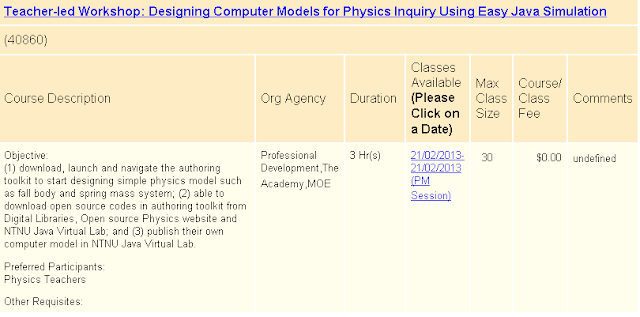 |
| TRASI code: 40860: Teacher-led Workshop: Designing Computer Models for Physics Inquiry Using Easy Java Simulation |
| TRASI code: 40860: Teacher-led Workshop: Designing Computer Models for Physics Inquiry Using Easy Java Simulation |
| Teacher-led Workshop: Designing Computer Models for Physics Inquiry Using Easy Java Simulation | |||
| Overview: | |||
| Objective: | |||
| (1) download, launch and navigate the authoring toolkit to start designing simple physics model such as fall body and spring mass system; (2) able to download open source codes in authoring toolkit from Digital Libraries, Open source Physics website and NTNU Java Virtual Lab; and
(3) publish their own computer model in NTNU Java Virtual Lab.
|
Content:
The Open Source Physics community using Easy Java Simulation (Esquembre, 2004) has created hundreds of computer models (simulations) that could be customized (Wee & Mak, 2009) to the Singapore syllabus for more targeted productive activities.
Target Audience:
Level:
Physics Teachers
Secondary
SDF:
DG:
$ 0
Pre-Requisite:
Date & Venue:
Begin Date/time:
End Date/time:
Application Closing Date:
Venue:
21/02/2013 14:30 - 17:30
21/02/2013 14:30 - 17:30
20/01/2013
2 Malan Road, Academy of Singapore Teachers, IT Room 3
Frequency:
half day
Course Administrator:
Organising Agency:
Name: Salimah Noorja Eusof
Professional Development,The Academy,MOE
Phone: 65091757
Email: This email address is being protected from spambots. You need JavaScript enabled to view it.
Trainer:
Training Agency:
Wee Loo Kang,Lee Tat Leong,Lye Sze Yee
Ed Tech Division(ETD)
Assessment Mode:
No. of Applications:
Max. Class Size:
0
30
Accepted!
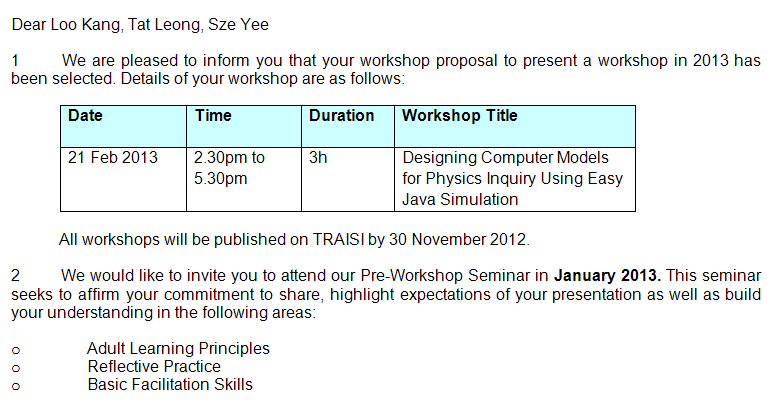 |
| Accepted! Confirmation of successful application to present & facilitate Teacher-led Workshops 2013 |
 |
| Easy Java Simulation authoring toolkit |
|
Name of
Main Facilitator
|
- eduLab project: NRF2011-EDU001-EL001 Java Simulation Design for Teaching and Learning
- 2012 MOE Innergy (HQ) GOLD Award “Gravity-Physics by Inquiry”.
At the end of the workshop, participants will be able to :
- download, launch and able to navigate the authoring toolkit to start designing simple physics model such as fall body and spring mass system.
- able to download open source codes in authoring toolkit from Digital Libraries, Open source Physics website and NTNU Java Virtual Lab.
- publish their own computer model in NTNU Java Virtual Lab
Theory:
Experiential learning (Dewey, 1958; Kolb, 1984) with computer model (Wolfgang Christian, Esquembre, & Barbato, 2011; Wee, 2012b)
• Open Source Physics OSP research:(M. Belloni, Christian, & Brown, 2007; Mario Belloni, Christian, & Mason, 2009; Brown & Christian, 2011; W. Christian, Belloni, & Brown, 2006; Wolfgang Christian, et al., 2011; Wolfgang Christian & Tobochnik, 2010; Esquembre, 2004; Hwang & Esquembre, 2003; Wee, 2010, 2012a; Wee, Esquembre, & Lye, 2012; Wee & Mak, 2009)
• Physics by Inquiry (McDermott, Shaffer, & Rosenquist, 1995; MOE, 2012; Wee, Lee, & Goh, 2011)
• Modeling Instruction (Jackson, Dukerich, & Hestenes, 2008)
(1) Active learning can be fun
‘. . . [It] is an eye opener . . . [we] do not usually get to learn with virtual learning environment . . . and it makes learning fun and interesting’.
‘The lesson was fun and makes us think instead of just listen[ing] to teacher and remember[ing] whatever the teacher said’.
‘It makes learning much more interesting and fun. It makes us want to learn and find out
more about the topic’.
(2) Need experience to understand
‘. . . It [this lab] lets me figure out the concepts rather than just listen[ing] and believing what is taught without understanding’.
‘Normally people would have to experience any physics concepts themselves hands [-] on to really remember concepts. Lectures on the other hand may not be effective since maybe what the lecturer is bringing through us is unclear, and thus practical lessons to learn concepts is a great learning deal’.
(3) Simulation can support inquiry learning and thinking like real scientists
‘These kinds of lesson force us to think critically. It makes us look at the results, analyse and then find the trend within, which is a really good way to learn independently. It also gives us confidence and a sense of accomplishment when the conclusions we arrive at are correct.’
‘Such vlab [virtual lab] lesson effectively utilizes the IT resources to enhance lessons, making physics lessons less dry. Besides, by identifying trends in values first hand, I can remember it easier rather than via lecture notes and slides’.
(4) Need for strong inquiry learning activities
‘The activity worksheet did not generate much thinking and concept understanding, just simply presents a set of values to copy to get the answers’.
‘It [virtual lab] helps hasten the process of learning but the exchange of data [in the worksheet activities] is troublesome’.
(5) Need for testing and well-designed simulation [7]
Some students suggest visual and audio enhancements such as ‘better quality so that the simulations could be more interesting and appealing’ and ‘add sound effects’.
A good suggestion that surfaced is to make the ‘program [simulation] designed as a game, thereby making it more interactive. At the end a table can be provided and it would
provide us [students] with the values. From there, we do analysis’.
This suggestion inspired us to design ‘Game for concept testing’ described earlier.
(6) Appreciative learners
‘I [student] really thank you for spending time coming up with this program. You are really an educator who cares and dares to try new things. Thanks! Hope you can come up with even better programs so that they can empower students in physics subject.’
‘Thank you teachers for spending time to develop this app.’
1 Physics Subject Chapter (17August 2012) Brown Bag Series for Senior and Lead Teachers
2 EduLab workshop scheduled 4Q 2012 eduLab@AST<br< a="">>
Physics Teachers in Primary, Secondary and JC/CI_________________
Presentation with hands-on activities
IT Training Room (one computer for each participant)
Yes (please specify):_Java Runtime and Java 3D.
Download the authoring toolkit here http://www.um.es/fem/EjsWiki/Main/Download choose the latest version
- Adams, W. K. (2010). Student engagement and learning with PhET interactive simulations. NUOVO CIMENTO- SOCIETA ITALIANA DI FISICA SEZIONE C, 33(3), 21-32.
- Adams, W. K., Paulson, A., & Wieman, C. E. (2008, July 23-24). What Levels of Guidance Promote Engaged Exploration with Interactive Simulations? Paper presented at the Physics Education Research Conference, Edmonton, Canada.
- Belloni, M., Christian, W., & Brown, D. (2007). Open Source Physics Curricular Material for Quantum Mechanics. Computing In Science And Engineering, 9(4), 24-31.
- Belloni, M., Christian, W., & Mason, B. (2009). Open Source and Open Access Resources for Quantum Physics Education. [Abstract]. Journal of Chemical Education, 86(1), 125-126.
- Brown, D., & Christian, W. (2011, Sept 15-17). Simulating What You See. Paper presented at the MPTL 16 and HSCI 2011, Ljubljana, Slovenia.
- Christian, W., Belloni, M., & Brown, D. (2006). An Open-Source XML Framework for Authoring Curricular Material. Computing In Science And Engineering, 8(5), 51-58.
- Christian, W., Esquembre, F., & Barbato, L. (2011). Open Source Physics. Science, 334(6059), 1077-1078. doi: 10.1126/science.1196984
- Christian, W., & Tobochnik, J. (2010). Augmenting AJP articles with computer simulations. American Journal of Physics, 78(9), 885-886.
- Dewey, J. (1958). Experience and nature: Dover Pubns.
- Esquembre, F. (2004). Easy Java Simulations: A software tool to create scientific simulations in Java. Computer Physics Communications, 156(2), 199-204.
- Finkelstein, N. D., Adams, W. K., Keller, C. J., Kohl, P. B., Perkins, K. K., Podolefsky, N. S., . . . LeMaster, R. (2005). When Learning about the Real World is Better Done Virtually: A Study of Substituting Computer Simulations for Laboratory Equipment. Physical Review Special Topics - Physics Education Research, 1(1), 010103.
- Hwang, F. K., & Esquembre, F. (2003). Easy java simulations: An interactive science learning tool. Interactive Multimedia Electronic Journal of Computer - Enhanced Learning, 5.
- Jackson, J., Dukerich, L., & Hestenes, D. (2008). Modeling Instruction: An Effective Model for Science Education. [Article]. Science Educator, 17(1), 10-17.
- Kolb, D. (1984). Experiential learning: experience as the source of learning and development: Prentice Hall.
- McDermott, L., Shaffer, P., & Rosenquist, M. (1995). Physics by inquiry: John Wiley & Sons New York.
- MOE. (2012). MOE Innergy Awards: MOE Innergy (HQ) Awards Winners : Gold Award :Educational Technology Division and Academy of Singapore Teachers: Gravity-Physics by Inquiry Retrieved 25 May, 2012, from http://www.excelfest.com/award
- Perkins, K., Adams, W., Dubson, M., Finkelstein, N., Reid, S., Wieman, C., & LeMaster, R. (2006). PhET: Interactive Simulations for Teaching and Learning Physics. The Physics Teacher, 44(1), 18-23. doi: 10.1119/1.2150754
- Perkins, K. K., Loeblein, P. J., & Dessau, K. L. (2010). Sims For Science. [Article]. Science Teacher, 77(7), 46-51.
- PhET. (2011). The Physics Education Technology (PhET) project at the University of Colorado at Boulder, USA from http://phet.colorado.edu/en/simulations/category/physics
- Wee, L. K. (2010, July 17-21). AAPT 2010 Conference Presentation:Physics Educators as Designers of Simulations. Paper presented at the 2012 AAPT Summer Meeting, Portland Oregon USA.
- Wee, L. K. (2012a, Feb 4-8). AAPT 2012 Conference Presentation:Physics Educators as Designers of Simulations. Paper presented at the 2012 AAPT Winter Meeting, Ontario CA USA.
- Wee, L. K. (2012b). One-dimensional collision carts computer model and its design ideas for productive experiential learning. Physics Education, 47(3), 301.
- Wee, L. K., Esquembre, F., & Lye, S. Y. (2012). Ejs open source java applet 1D collision carts with realistic collision from http://www.phy.ntnu.edu.tw/ntnujava/index.php?topic=2408.0
- Wee, L. K., Lee, T. L., & Goh, J. (2011, 10 November). Physics by Inquiry with Simulations Design for Learning Paper presented at the The Academy Symposium, Singapore.
- Wee, L. K., & Mak, W. K. (2009, 02 June). Leveraging on Easy Java Simulation tool and open source computer simulation library to create interactive digital media for mass customization of high school physics curriculum. Paper presented at the 3rd Redesigning Pedagogy International Conference, Singapore.
- Weiman, C., & Perkins, K. (2005). Transforming Physics Education. Physics Today, 58(11), 36-40.
- Wieman, C. E., Adams, W. K., Loeblein, P., & Perkins, K. K. (2010). Teaching Physics Using PhET Simulations. Physics Teacher, 48(4), 225-227.
- Wieman, C. E., Adams, W. K., & Perkins, K. K. (2008). PhET: Simulations That Enhance Learning. [Article]. Science, 322(5902), 682-683.
- Wieman, C. E., Perkins, K. K., & Adams, W. K. (2008). Oersted Medal Lecture 2007: Interactive simulations for teaching physics: What works, what doesn't, and why. American Journal of Physics, 76(4), 393-399. doi: 10.1119/1.2815365
 |
| letter from chan yew wooi, DDPD AST |
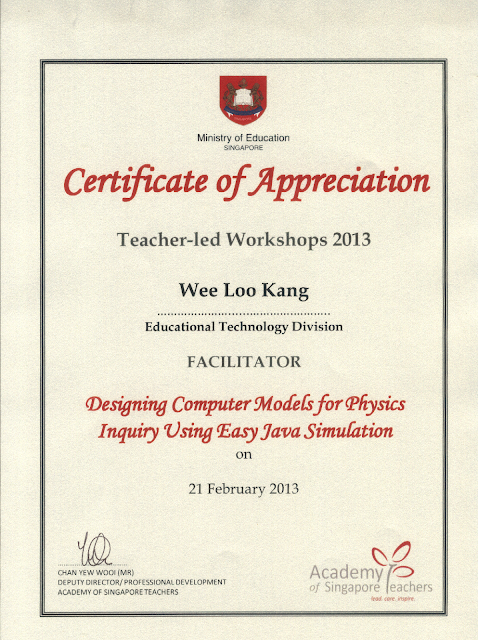 |
| teacher-led workshop |
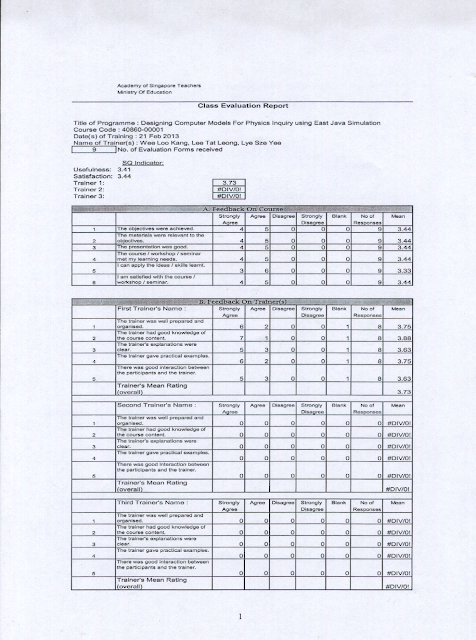 |
| trainer rating 3.73 out of 4! |
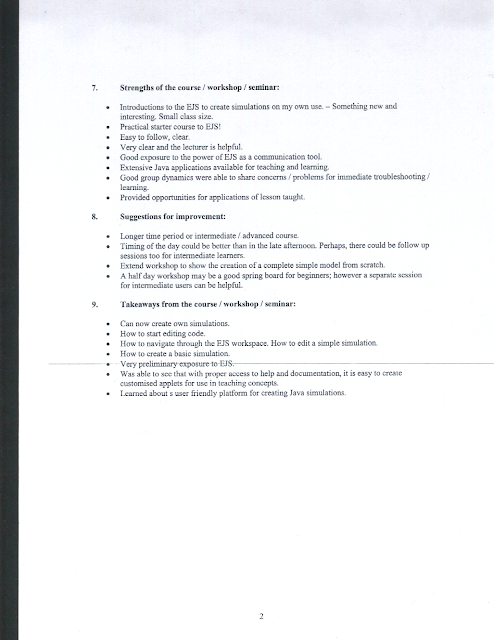 |
| master class? |
 |
| Chai_Yaw opening |
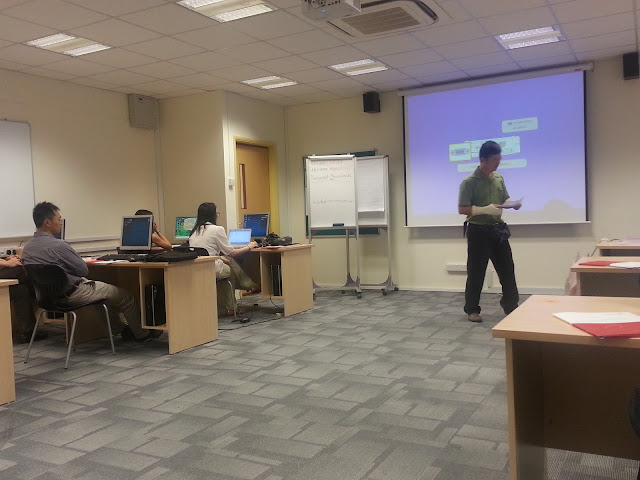 |
| Teacher-led Workshop: Designing Computer Models for Physics Inquiry Using Easy Java Simulation |
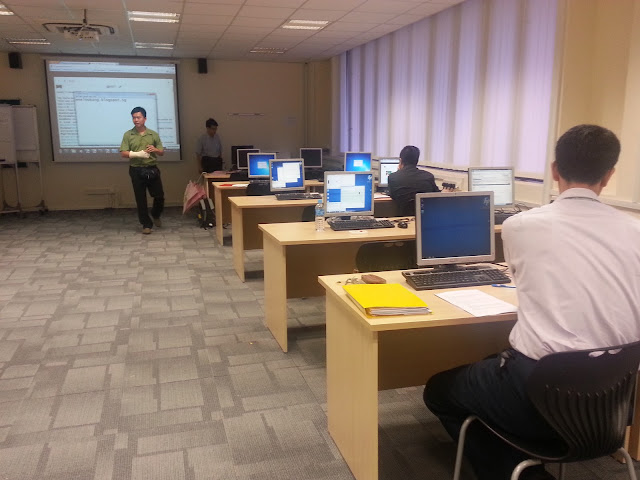 |
| Teacher-led Workshop: Designing Computer Models for Physics Inquiry Using Easy Java Simulation |
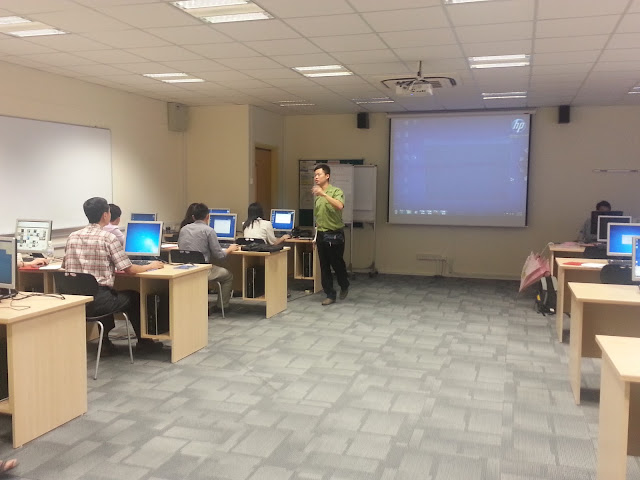 |
| Teacher-led Workshop: Designing Computer Models for Physics Inquiry Using Easy Java Simulation |
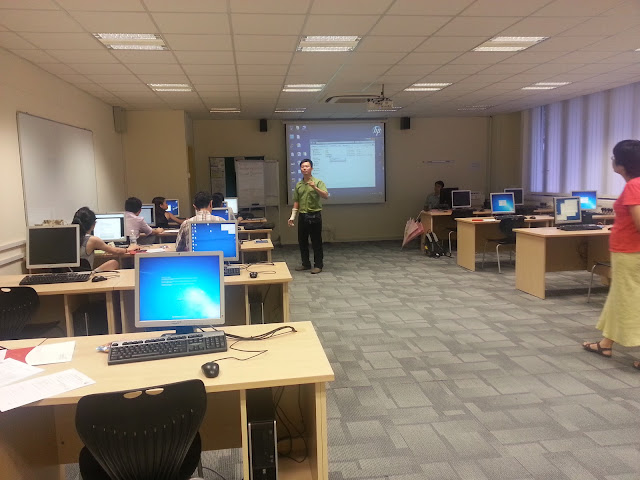 |
| Teacher-led Workshop: Designing Computer Models for Physics Inquiry Using Easy Java Simulation |
 |
| Teacher-led Workshop: Designing Computer Models for Physics Inquiry Using Easy Java Simulation |
 |
| Teacher-led Workshop: Designing Computer Models for Physics Inquiry Using Easy Java Simulation |
 |
| Teacher-led Workshop: Designing Computer Models for Physics Inquiry Using Easy Java Simulation |
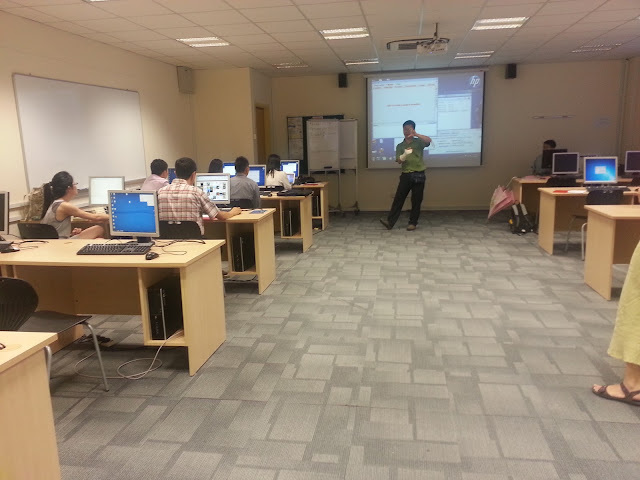 |
| Teacher-led Workshop: Designing Computer Models for Physics Inquiry Using Easy Java Simulation |
 |
| Teacher-led Workshop: Designing Computer Models for Physics Inquiry Using Easy Java Simulation. lookang with a cast on right hand :) |
 |
| Teacher-led Workshop: Designing Computer Models for Physics Inquiry Using Easy Java Simulation |
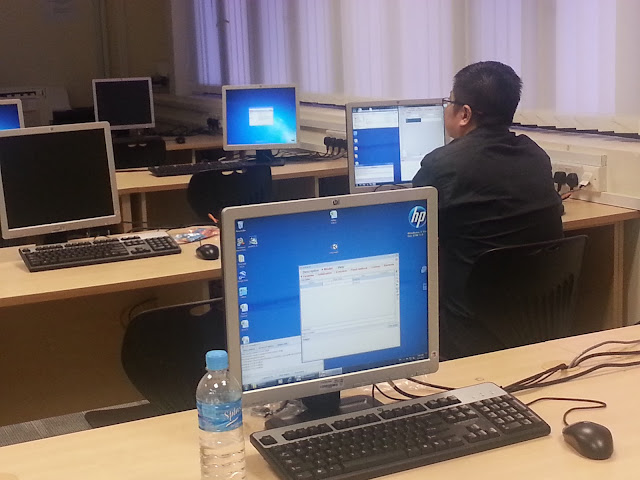 |
| Teacher-led Workshop: Designing Computer Models for Physics Inquiry Using Easy Java Simulation |
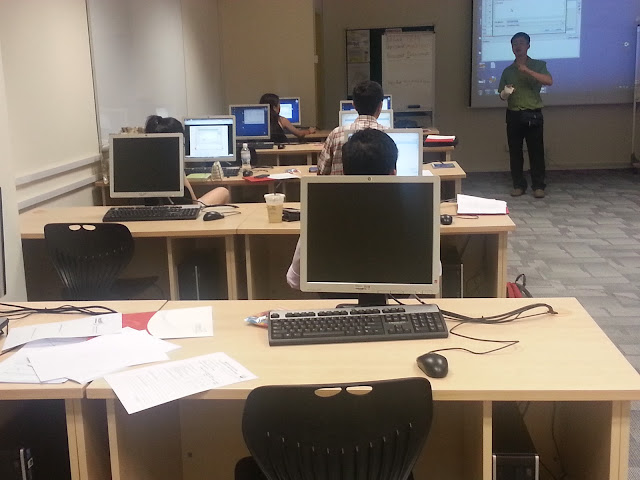 |
| Teacher-led Workshop: Designing Computer Models for Physics Inquiry Using Easy Java Simulation |
 |
| Teacher-led Workshop: Designing Computer Models for Physics Inquiry Using Easy Java Simulation |
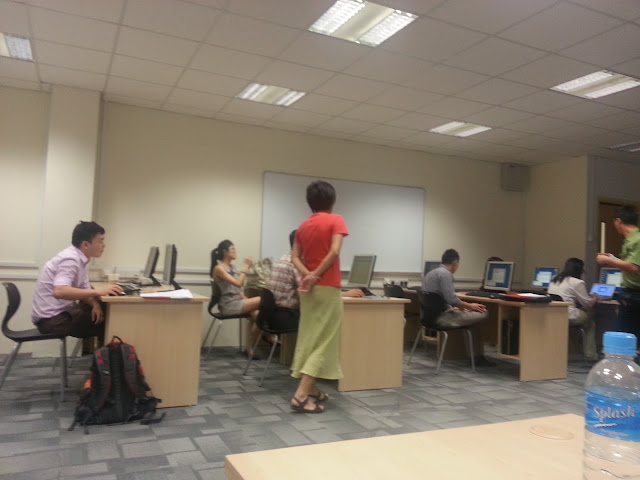 |
| Teacher-led Workshop: Designing Computer Models for Physics Inquiry Using Easy Java Simulation |
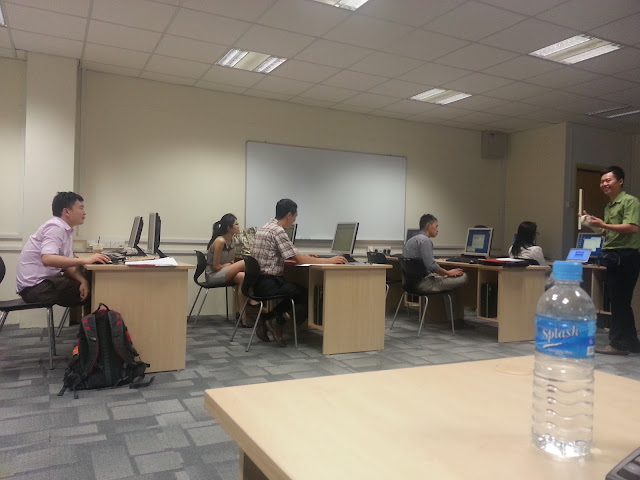 |
| Teacher-led Workshop: Designing Computer Models for Physics Inquiry Using Easy Java Simulation |
 |
| Teacher-led Workshop: Designing Computer Models for Physics Inquiry Using Easy Java Simulation |
 |
| Teacher-led Workshop: Designing Computer Models for Physics Inquiry Using Easy Java Simulation. tatleong's analysis of a falling ball |
 |
| Teacher-led Workshop: Designing Computer Models for Physics Inquiry Using Easy Java Simulation |
 |
| Teacher-led Workshop: Designing Computer Models for Physics Inquiry Using Easy Java Simulation |
 |
| Teacher-led Workshop: Designing Computer Models for Physics Inquiry Using Easy Java Simulation |
 |
| Teacher-led Workshop: Designing Computer Models for Physics Inquiry Using Easy Java Simulation |
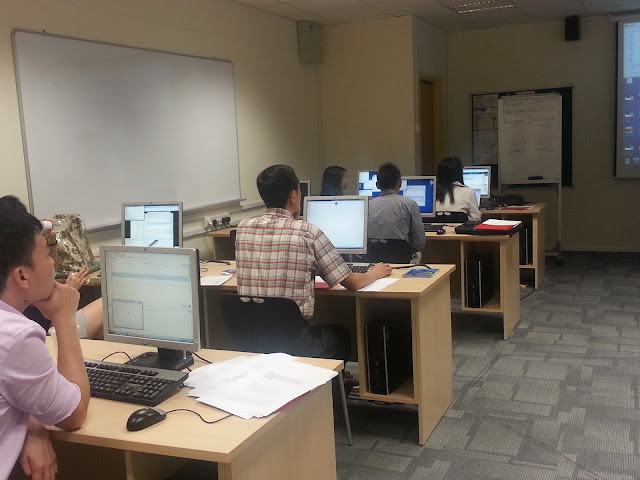 |
| Teacher-led Workshop: Designing Computer Models for Physics Inquiry Using Easy Java Simulation |
 |
| Teacher-led Workshop: Designing Computer Models for Physics Inquiry Using Easy Java Simulation |
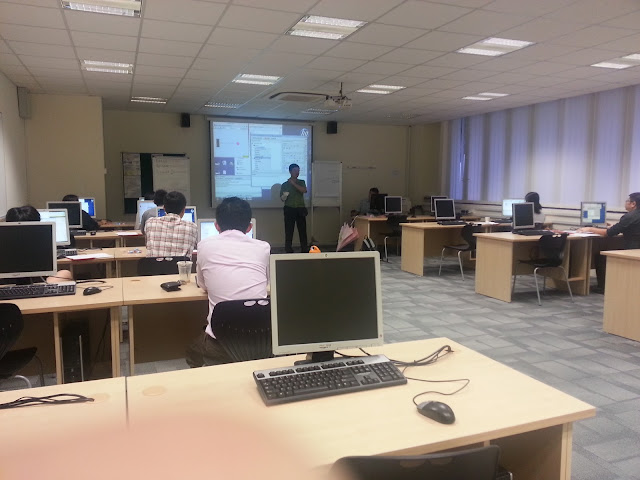 |
| Teacher-led Workshop: Designing Computer Models for Physics Inquiry Using Easy Java Simulation |
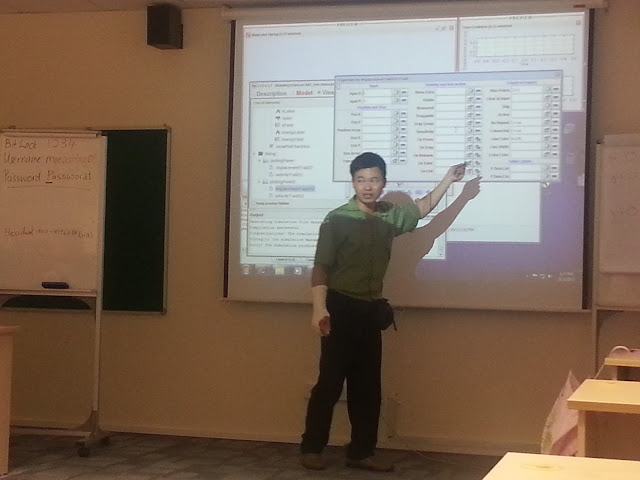 |
| Teacher-led Workshop: Designing Computer Models for Physics Inquiry Using Easy Java Simulation |
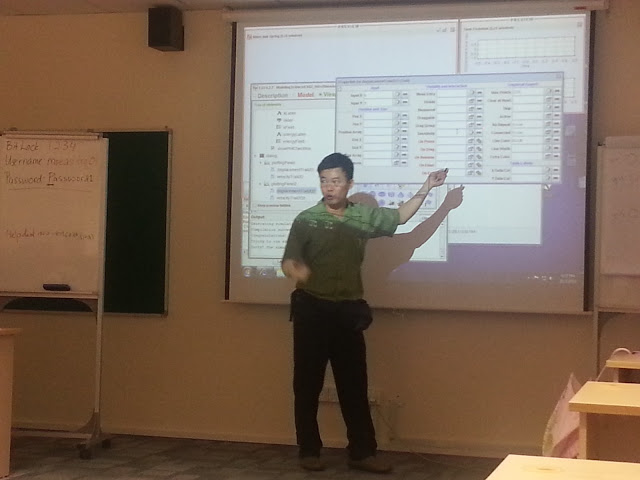 |
| Teacher-led Workshop: Designing Computer Models for Physics Inquiry Using Easy Java Simulation |
FAQ: Easy Java Simulation (EJS) and Physics Education
- What is Easy Java Simulation (EJS) and what is its primary purpose?
- Easy Java Simulation (EJS) is a free, open-source authoring toolkit that allows educators and students to create interactive computer models and simulations, particularly in physics. Its primary purpose is to provide a flexible platform for designing, customizing, and sharing simulations for educational purposes. These simulations can be used as interactive learning tools, enabling students to explore scientific concepts in a dynamic, visual way, thus promoting a deeper understanding through experiential learning.
- How does EJS support inquiry-based learning in Physics?
- EJS facilitates inquiry-based learning by allowing educators to create simulations that act as virtual laboratories. Students can manipulate variables within these models, observe the outcomes, and analyze trends in the data. This process encourages critical thinking, problem-solving skills, and independent learning, mirroring the practices of real scientists. Through this active approach, students are more likely to develop a stronger conceptual understanding than through passive learning methods like lectures alone. The simulations can also create a shared platform for social discourse and collaborative learning.
- What is the Open Source Physics (OSP) community and how does it relate to EJS?
- The Open Source Physics (OSP) community is a collaborative network of educators and developers who create and share educational resources, including computer models and simulations. EJS is a key tool used by the OSP community to develop these simulations. Many pre-built, customizable models are available through OSP resources, such as the NTNU Java Virtual Lab, which teachers can download, modify, and use in their classrooms. This collaborative, open-source approach enables teachers to scale up and personalize simulations for a variety of lessons and subject areas.
- What are the main benefits of using computer simulations like those created with EJS in physics education?
- Computer simulations provide a safe and efficient laboratory environment where students can experiment with physical phenomena that might be difficult or impossible to replicate in a traditional classroom. Simulations promote active learning by engaging students in a hands-on way that moves beyond passive listening. They allow students to visualize and interact with abstract concepts, facilitating understanding. Students have reported that simulation-based learning makes physics fun and interesting. They also allow students to explore "what if" scenarios and reinforce concepts learned through experimentation.
- What kinds of simulations can be built using EJS?
- EJS is highly versatile and capable of producing simulations for a wide array of physics topics. This includes, but is not limited to: mechanics (e.g., falling bodies, spring-mass systems, collisions, projectile motion), electromagnetism (e.g., magnetic fields, current carrying wires), thermodynamics, and even aspects of quantum mechanics. EJS simulations can model scenarios in both two and three dimensions and incorporate many visual and numerical data representations. The ability to build these models helps learners gain more control of the learning process.
- What does the workshop described in the source aim to teach teachers about using EJS?
- The workshop aims to train physics teachers to use EJS as a tool for creating and customizing simulations to support physics inquiry. The goal is that teachers would be able to (1) download, launch, and navigate the EJS authoring toolkit to design basic physics models; (2) download open source codes from digital libraries such as Open Source Physics and the NTNU Java Virtual Lab; and (3) publish their own simulations on the NTNU Java Virtual Lab. The workshop aims to build teacher leadership and facilitate the use of computer models in teaching physics. The workshop draws on learning theories such as experiential learning and pedagogical strategies such as physics by inquiry and modeling instruction.
- What evidence exists to show the positive impact of using EJS-based simulations in physics education?
- Research and anecdotal evidence highlight several positive impacts. Simulations make learning more engaging and fun, which can increase motivation. Simulations provide concrete experiences, thus enhancing comprehension. They encourage students to think critically and analyze data like scientists. The simulations also cater to different learning styles and allow for more personalized learning experiences. Students can build confidence and a sense of accomplishment when reaching conclusions using simulations. Finally, the simulations allow teachers to assess learning in a more dynamic way.
- Are there any specific software or platform requirements to run EJS simulations, and where can teachers access the necessary materials and tools?
- EJS simulations are primarily Java-based, so it is necessary to have Java installed on the computer. Additionally, for some simulations, the Java 3D library might be required. The Easy Java Simulation authoring toolkit can be downloaded from the official website. Teachers can also access open-source codes and simulation examples from sites like the Open Source Physics website and the NTNU Java Virtual Lab. These resources, along with the tools, are available free of charge and can be easily integrated into lessons.

